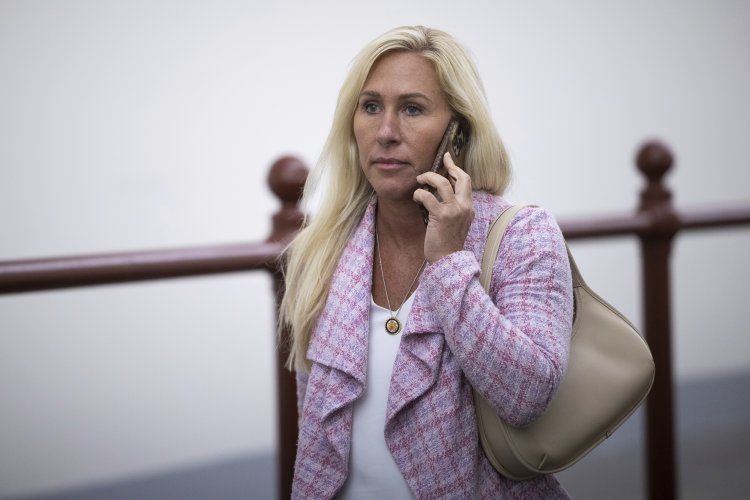Republicans hoped to expand their Senate majority, but the electoral map is proving more challenging.
Democrats are eagerly anticipating the prospect of Rep. Marjorie Taylor Greene (R-Ga.) potentially entering the Senate race.

The situation might worsen as President Donald Trump's tariffs generate turmoil in global markets ahead of next year's midterms, revealing a murky economic outlook.
While Republicans are still generally expected to hold onto the Senate, the rejections from Kemp and former New Hampshire Gov. Chris Sununu of GOP recruitment efforts, combined with Texas Attorney General Ken Paxton's challenge to establishment Sen. John Cornyn, foreshadow a more turbulent cycle than anticipated.
Adding to the challenges are potential primary threats in Louisiana and North Carolina, where prominent MAGA figures are positioned against long-serving incumbents.
“Midterm elections [are] generally tough for the party in power,” Sen. Ron Johnson said in a brief interview. “I’m always worried.”
Johnson's concerns are warranted. A senior Senate GOP campaign official, who requested anonymity to speak candidly about the situation, expressed a desire for both Kemp and Sununu to enter the race, as well as for Paxton to abstain from challenging Cornyn. This official and others involved in GOP recruitment stressed that the party hadn't fully relied on either governor, viewing them as longshot prospects despite concerted efforts to court them.
In Texas, the Senate GOP campaign official indicated that a “serious effort” would be made to secure Cornyn's nomination. Recently, the senator enlisted former Trump pollster Tony Fabrizio to enhance his MAGA credentials, as noted by two individuals familiar with the move. GOP senators aimed to discourage Paxton from entering the race, trying to undermine him before his announcement and urging Trump to endorse Cornyn, a close ally and former chair of the Senate’s campaign arm.
It's still unclear whether Trump or the White House will ask Paxton to withdraw. Advisers within the White House acknowledge his potential as a political liability, especially given the high costs associated with campaigning in Texas.
In Michigan, Republicans could encounter another unwanted primary as Rep. Bill Huizenga considers joining former Rep. Mike Rogers in vying for retiring Sen. Gary Peters' seat.
In Georgia, however, Republicans are downplaying any dismay over Kemp's departure, highlighting the increasing interest from a variety of candidates emerging from both the House and state government.
Democrats are keen on the possibility of Rep. Marjorie Taylor Greene participating in the race, a move she hinted at even before Kemp's announcement. Nevertheless, GOP senators expressed confidence on Tuesday, minimizing apprehensions that Greene could jeopardize their chances.
“I’m encouraged by the fact there’s a lot of interest,” Senate Majority Leader John Thune remarked Tuesday when asked about the potential for the GOP to flip the seat with Greene as the nominee. “I expect Georgia will be a competitive race. We’ll be close to the end. But I think it’s a race that we can win.”
Democrats interpret the GOP's failure to recruit Kemp and Sununu as a sign that even strong Republican candidates are hesitant to endure a challenging cycle defending Trump’s policies, particularly in light of the economic repercussions of his tariffs.
Democratic Senatorial Campaign Committee spokesperson Maeve Coyle stated that “every GOP candidate will be forced to answer for Trump’s harmful agenda” in 2026, claiming that the party’s “disastrous start to the year” places Democrats in an offensive position, despite facing a challenging electoral map.
“Senate Democrats are positioned to win seats in 2026,” she asserted.
However, the outlook for Democrats in retaking the Senate remains daunting, compounded by several retirements. The party has few opportunities for pickups, with only one seat held by a Republican in a state that former Vice President Kamala Harris won in 2024 and four open seats to defend across battleground Michigan and three solidly blue states.
National Republican Senatorial Committee spokesperson Joanna Rodriguez noted that Republicans must “hold every red seat and chase opportunities in toss-up states like Georgia, Michigan and New Hampshire.” In Georgia, where Trump emerged victorious in 2024, “we remain confident a Republican will beat pro-impeachment Democrat Jon Ossoff in 2026.”
Some GOP senators, including former NRSC chair Rick Scott of Florida, have suggested that the recruitment challenges reflect how potential candidates perceive the work in Washington compared to their roles as governors back home.
“I don’t think it’s about chances, I think it’s about: they know how difficult this job is,” the former Florida governor stated in an interview. “Governors get to be the executive and lead the state. The legislative process is a lot harder, especially up here. I think it probably reflects more how difficult it is to get a result up here.”
Despite this, Republican senators generally maintain that Democrats face a tougher map.
“I would much rather have the Republican side of this map than the Democrat side of this map,” Sen. Ted Cruz said in an interview, acknowledging that it's “unfortunate” both Kemp and Sununu opted out, as they would have “been very strong candidates.”
Nonetheless, numerous Republican senators and operatives recognize that their overall success may heavily depend on the economy and the effects of Trump’s tariffs over the coming months.
“I don’t think there’s going to be a problem — it depends on the economy, obviously,” remarked Sen. Tommy Tuberville of Alabama, who is considering running for governor rather than seeking reelection next year. “It depends on how President Trump does in the next 12 months.”
Jay Williams, a GOP strategist based in Alpharetta, Georgia, indicated that his party may face an increasingly grim outlook.
“I think ultimately it's going to come down to the economy and at that time, and how scared Republicans are,” Williams stated. “If things economically are going well, you'll get to the social issues playing more a deciding factor. If things are really bad economically, I think it's gonna be tough for Republicans. Like, I don't know how you slice it any other way.”
He added, “Never underestimate Republicans' ability to pull defeat from the jaws of victory.”
Anna Muller for TROIB News












